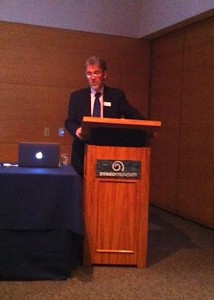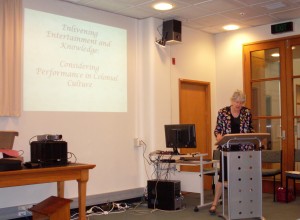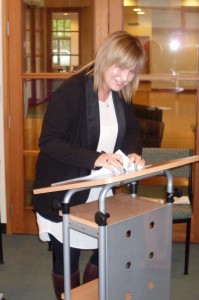CFP: Collectors, Collecting and Collections
Collectors/Collecting/Collections
A Call for Papers
The Centre for the Book at the University of Otago will be holding a two day symposium on Collectors/Collecting/Collections on 17 & 18 October 2013.
On the evening of 17 October in the Dunningham Room, Dunedin Public Library, Jim E. Traue, ex-Turnbull Librarian, Wellington, will give an open lecture entitled: ‘Treasured up on purpose to a life beyond life’.
The Symposium proper will begin at 10.00 on 18 October at the Auditorium, Toitū Early Settlers Museum. It will finish at 5.00 pm.
*
There is no end to collecting. There are collectors of the first editions or earliest printings of various works of literature, history, science, and philosophy; of bibles, children’s books, travel books, and almanacs; and still others ranging from limited private press productions to collectors of manuscripts and illustrated books. There are also those who collect thimbles, decorative teaspoons, cakes tins, art, motorcycles, and a whole lot more.
The methods by which collectors amass their materials are equally varied, including through catalogue, auction, gifts, and e-sites like Trademe and abebooks.com. Indeed, by accumulating such items, the question arises: what constitutes a collection? Is it a disparate mass of stuff, or something much more organised?
Institutions throughout New Zealand have been fortunate to benefit from collectors such as Alexander Turnbull, Sir George Grey, A. H. Reed, and Dr Hocken, to name but a few. Their collections are in the public domain for all to use and enjoy; we would be much poorer without their efforts. There are, however, those that are lost, such as General Robley’s moko collection, and Rex Nan Kivell’s New Zealand-related collection (now in Australia). And what of the future? Will institutions continue to receive collections from generous public-spirited collectors, or will they disperse them to the four winds, for others to enjoy?
If you would like to participate in this symposium, which we hope will be wide ranging, please send your abstracts to Dr Shef Rogers, English Department, University of Otago (shef.rogers@otago.ac.nz) or Dr Donald Kerr, Special Collection Librarian, University of Otago (Donald.kerr@otago.ac.nz) by 31 August 2013.
Registration for the full day will be $25 (waged); $10 (unwaged). Details of how to register will be notified on the Centre’s website closer to the event.
Colonial Origins of NZ Politics and Government
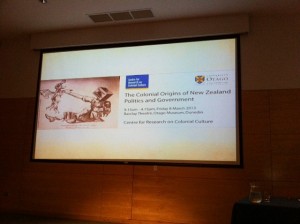 On Friday March 8th, members of the Centre gave presentations on aspects of the colonial origins of New Zealand politics and government. This was our contribution to the “conversation” with the Constitutional Advisory Panel, a body established by the government to canvass public views on the constitution. This was a public event, held at the Otago Museum, and attended by a variety of people throughout the day. Present were two panel members, Peter Chin and Sir Tipene O’Regan, and the panel’s administrative organiser, Lison Harris.
On Friday March 8th, members of the Centre gave presentations on aspects of the colonial origins of New Zealand politics and government. This was our contribution to the “conversation” with the Constitutional Advisory Panel, a body established by the government to canvass public views on the constitution. This was a public event, held at the Otago Museum, and attended by a variety of people throughout the day. Present were two panel members, Peter Chin and Sir Tipene O’Regan, and the panel’s administrative organiser, Lison Harris.
Professor Tony Ballantyne, the Centre director, welcomed those attending, and this was followed by talks on theimpact of religion (Assoc Prof John Stenhouse); the political aspirations of early colonists (Prof Ballantyne); how rangatiratanga was understood in the colonial period (Dr Lachy Paterson); Māori voting patterns (Dr Paerau Warbrick-Anderson); iwi and the state (Dr Michael Stevens); the making of modern politics (Prof Tom Brooking); and the relationship between art and politics (Assoc Prof Mark Stocker). To round off the day, Sir Tipene O’Regan and Prof Erik Olssen offered their thoughts on the day’s events.
Check out more images here on the Department of History and Art History Facebook page.
Constitutional Conversation
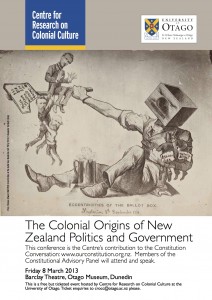 The Centre for Research on Colonial Culture is holding a one-day symposium at the Otago Museum (Barclay Theatre) on Friday 8 March. The speakers in this event will reflect on New Zealand’s political history and its constitutional development. This symposium is designed to cast new light on important historical questions but it also functions as the Centre’s contribution to the ‘Constitutional Conversation’. Members of the Constitutional Advisory Panel (CAP) will be attending and Sir Tipene O’Regan, co-chair of CAP, will participate in the final discussion session. This event is open to the public and there is no registration fee: morning and afternoon tea will be provided (but not lunch). But entrance will be by ticket only as space is restricted. If you want a ticket please email <crocc@otago.ac.nz> – there is limited space and tickets will be issued on a first come, first served basis.
The Centre for Research on Colonial Culture is holding a one-day symposium at the Otago Museum (Barclay Theatre) on Friday 8 March. The speakers in this event will reflect on New Zealand’s political history and its constitutional development. This symposium is designed to cast new light on important historical questions but it also functions as the Centre’s contribution to the ‘Constitutional Conversation’. Members of the Constitutional Advisory Panel (CAP) will be attending and Sir Tipene O’Regan, co-chair of CAP, will participate in the final discussion session. This event is open to the public and there is no registration fee: morning and afternoon tea will be provided (but not lunch). But entrance will be by ticket only as space is restricted. If you want a ticket please email <crocc@otago.ac.nz> – there is limited space and tickets will be issued on a first come, first served basis.
Presenters Perform
A very successful symposium on Colonial Performance was held at the Hocken Collections Seminar Room on Monday, November 19th. Presenters gave illuminating talks on a wide range of colonial performances from Irish drama in Dunedin, to Maori performers in Manhattan, to the theatre of the Dunedin police court, among other topics.
Barbara Brookes, who convened the day-long symposium, kicked off the event with a discussion of touring medical lecturer Dr. Anna Longshore Potts.
Barbara was followed by two presentations on the theatre scene in Dunedin. Lisa Warrington invited us into Dunedin’s first theatre, a converted horse stable, and Peter Kuch drew attention to the importance of Irish drama in the development of Dunedin theatre during the 1860s. Kirstine Moffatt entertained us all with stories about the amateur pianist, who appeared in private homes, at concerts held in church halls, and barns.
Unlike Richard John Seddon, who spoke for hours at a time, Tom Brooking used a mere 20 minutes to describe the role of performance in colonial politics. At the same time he revealed some of the popular prejudices against Seddon in New Zealand’s historiography. Rosi Crane drew upon her doctoral research in the history of science to show how university professors used their role as public intellectuals to advance scientific understanding, for example in the field of evolution.
Bronwyn Dalley gave a vivid account of the many re-inventions of ‘urban investigator’, free-thinker and spiritualist, Lotti Wilmott in 1880s Christchurch. The tensions between ethnographic ideas about race and “primitive” societies were put to the test by the appearance of Maori performers at New York City’s Hippodrome in 1909-10. Marianne Schultz, from Auckland University, also explored how the leaders of the US suffragette movement used the case of Maori women, who had the right to vote, in their own campaigns for enfranchisement. Michelle Willyams also looked at Maori performers and performance, highlighting the hybrid nature of the musical repertoire developed by Reverend Seamer’s Waiata Maori Choir in the 1920s and 1930s.
University of Otago MA student Fabia Fox walked us through the streets of nineteenth-century Dunedin, and into the backyards of homes in the ‘Devil’s Half-Acre’ famous for its criminal underclass. Their exploits were often played out in the Dunedin police court, and relayed to a voyeuristic reading public through the column of the court reporter. In contrast, John Stenhouse embellished his talk on the Rev. Rutherford Waddell with his own rendition of excerpts from his famous sermon on the sin of cheapness. Prof. Lyn Tribble (English) eloquently wrapped up the day, drawing together the various themes into what she described as an ecology of performance.
Colonial Performances Abstracts
A feast of enticing papers are on offer at the Colonial Performances Symposium, which takes place at the Hocken Collections on Monday November 19th.
Feel free to read the Abstracts, which are now available.
Commanding an Audience
A research symposium concerned with colonial performance will take place at the Hocken Collections on Monday, November 19th.
Have a look at the Symposium Programme here.
This is a free event, but numbers are limited! If you are interested in attending contact Professor Barbara Brookes

